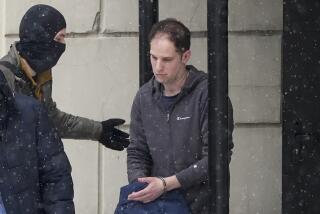Ida Milgrom, 94; Sought Dissident Son’s Freedom
- Share via
Ida Milgrom, the mother of former Soviet dissident Anatoly Shcharansky who stubbornly waged a nine-year battle for her son’s release from Soviet prison and labor camps, has died. She was 94.
Milgrom, who suffered a stroke March 29 and never regained consciousness, died Wednesday in Jerusalem.
Shcharansky, a mathematician and computer specialist, had become an outspoken leader among the refuseniks, as would-be emigres who were prevented from leaving the Soviet Union were called, after his visa was denied in the mid-’70s.
He had planned to join his bride, Avital, who had immigrated to Israel the day after they were married.
Arrested in 1977, Shcharansky was convicted a year later on charges of treason, espionage and anti-Soviet activities. He had been accused of betraying secrets to the Central Intelligence Agency, a charge that President Carter publicly denied.
Shcharansky was sentenced to three years in prison, retroactive to his arrest, and 10 years at hard labor.
Just as Shcharansky stubbornly refused to admit to crimes he did not commit, his tiny, white-haired mother stubbornly appealed to authorities for his freedom and demanded that they ease her son’s living conditions in prison.
At the same time, Shcharansky’s wife waged her own battle to gain her husband’s freedom by traveling to Western countries to enlist support.
During the family’s nine-year ordeal, Milgrom saw her son only six times.
On the few occasions she and her older son, Leonid, visited Shcharansky, they had to travel 36 hours by train, then by bus, often through subzero weather.
The meetings were brief, only an hour; two at the most. A guard would stand by as they spoke to one another, and though Milgrom yearned to embrace her son, a glass partition separated them.
But she was grateful for the time they had.
“I would study his eyes, his voice, his expressions,” she told the Toronto Star in 1987. “Then, when the visit was over, I would analyze his every gesture, and begin waiting for the next visit.”
Once, as punishment for Shcharansky, prison officials refused to let his mother enter the prison. But she showed up at the prison gate every morning for 10 days demanding, in vain, to see her son.
Finally, Milgrom received word that her son would be freed: As part of an East-West exchange of prisoners, he would be flown from a Soviet labor camp to East Berlin and from there to West Germany.
On Feb. 11, 1986, Leonid Shcharansky drove his mother to a friend’s home in Moscow, where they were greeted by a throng of reporters and television lights and cameras.
There had been previous rumors over the years that her son, who spent a total of 403 days in isolation cells, would be freed, and she worried that she’d again be disappointed.
Only when Leonid answered a telephone call from a reporter informing him that his brother had safely passed into the West did Milgrom allow herself to break down with great sobs of joy.
“Can you believe it?” she exclaimed. “Tolya is free, God almighty, Tolya is free! For so many years the placards read, ‘Free Shcharansky,’ and now Shcharansky is free.”
Her son’s freedom, however, did not end her activism.
She logged thousands of miles traveling to meet with government officials and American Jewish communities and spreading her message that as long as thousands of Soviet dissidents and refuseniks were denied visas to emigrate, freedom-loving people must continue to demand their release.
“I could never have imagined this is what would become of my life,” she told the Toronto Star in 1987. “There was never a day that I didn’t think of my son, never a moment that I didn’t work for his freedom.
“But it wasn’t I who freed him. It was the housewives around the world who demonstrated, who went to rallies, who demanded his release. That is why I am doing this now.”
Born Ida Petrovna Milgrom in Balta, Ukraine, in 1908, she was a promising pianist who studied at the Moscow Tchaikovsky Conservancy. She once explained that she gave up her plans of becoming a pianist after hearing fellow student Vladimir Horowitz rehearsing.
She then trained as an engineer-economist at the Odessa Polytechnic Institute. While raising her sons, she worked first in the metallurgy industry and then for the Soviet ministry of mining.
Her husband, Boris Shcharansky, who worked for an industrial journal when they met, died in 1980.
After his release from prison, Anatoly Shcharansky moved to Israel; six months later, his mother, his brother and his brother’s family received exit visas and were allowed to join him and his family.
Shcharansky, who took the name Natan Sharansky, became head of a new-immigrants party and later rose to become Israel’s minister of trade and industry. He is now a deputy prime minister and head of a Russian immigrants’ party.
His brother Leonid lives in Des Moines.
In addition to her sons, Milgrom is survived by four grandchildren.
More to Read
Sign up for Essential California
The most important California stories and recommendations in your inbox every morning.
You may occasionally receive promotional content from the Los Angeles Times.













